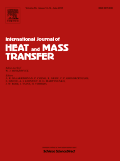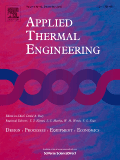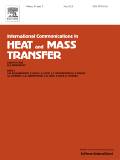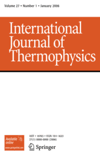
Journal of Engineering Thermophysics
Scope & Guideline
Exploring the synergy of heat and engineering excellence.
Introduction
Aims and Scopes
- Thermophysical Properties:
Research focusing on the characterization of thermophysical properties of various materials and fluids, including phase transitions, thermal conductivity, and heat capacity. - Heat Transfer Mechanisms:
Studies on the mechanisms of heat transfer, including conduction, convection, boiling, and evaporation, often in complex systems such as microchannels or nanofluids. - Thermal Management in Engineering Applications:
Exploration of thermal management strategies in engineering applications, such as heat exchangers, refrigeration systems, and combustion processes. - Numerical and Experimental Approaches:
A blend of numerical simulations and experimental methodologies to investigate and validate heat transfer phenomena and thermophysical properties. - Emerging Materials and Technologies:
Investigation of new materials and technologies, such as nanofluids and phase change materials, that enhance thermal performance in various applications.
Trending and Emerging
- Nanofluids and Hybrid Materials:
Research on nanofluids and hybrid materials is rapidly increasing, focusing on their enhanced thermal properties and applications in heat transfer systems. - Low Global Warming Potential Refrigerants:
The shift towards low-GWP refrigerants is a significant trend, with studies analyzing their performance and implications for energy efficiency. - Advanced Thermal Management Technologies:
Emerging technologies for thermal management, including innovative heat exchanger designs and thermal energy storage systems, are gaining prominence. - Machine Learning and Data-Driven Approaches:
The integration of machine learning and data-driven methodologies in thermal analysis and diagnostics is becoming a key area of exploration. - Sustainable and Renewable Energy Applications:
Research focusing on the application of thermophysical principles in sustainable energy technologies, such as solar thermal systems and waste heat recovery, is on the rise.
Declining or Waning
- Traditional Refrigerants:
Research focusing on conventional refrigerants, particularly those with high global warming potential, has seen a decline in favor of studies on low-GWP alternatives. - Basic Heat Transfer Principles:
Papers that cover fundamental heat transfer principles without application to modern contexts or technologies are becoming less frequent, as the field evolves towards more applied and innovative studies. - Single-Phase Fluid Studies:
There is a noticeable reduction in research focused solely on single-phase fluid heat transfer, with a shift towards more complex multi-phase and nanofluid investigations. - Static Heat Transfer Systems:
Investigations centered on static or non-dynamic heat transfer systems are appearing less often, as the field moves towards dynamic systems and real-time thermal management solutions.
Similar Journals

INTERNATIONAL JOURNAL OF HEAT AND MASS TRANSFER
Charting New Territories in Thermal and Fluid SciencesINTERNATIONAL JOURNAL OF HEAT AND MASS TRANSFER is a premier, peer-reviewed academic journal published by PERGAMON-ELSEVIER SCIENCE LTD, focusing on the vital fields of condensed matter physics, fluid flow, and transfer processes, as well as mechanical engineering. With an impressive impact factor and consistently ranked in the Q1 quartile across multiple engineering and physics categories, this journal stands out for its rigorous scholarship and relevance to advancements in heat and mass transfer phenomena. Spanning from 1960 to 2024, it serves as a critical platform for researchers and professionals aiming to disseminate innovative findings and foster cutting-edge discussions in these interconnected domains. Though it operates on a subscription model, readers benefit from a comprehensive archive that covers seminal studies and contemporary advancements. Academics and practitioners alike can deepen their understanding of the complex interplay between heat and mass transfer, which is essential for numerous applications in engineering and scientific research.

Case Studies in Thermal Engineering
Connecting Theory and Practice in Thermal EngineeringCase Studies in Thermal Engineering, published by ELSEVIER, stands as a premier platform for innovative research and analysis in the field of thermal engineering since its inception in 2013. With a robust Open Access model, this journal ensures that groundbreaking findings in fluid flow and transfer processes are readily accessible to a global audience, fostering collaboration and knowledge sharing across disciplines. Situated in the United Kingdom, the journal boasts an impressive impact factor, reflecting its status in the first quartile (Q1) for both engineering (miscellaneous) and fluid flow and transfer processes, as noted in the latest Scopus rankings. Researchers and professionals alike recognize its significance, ranking 9th out of 96 in Chemical Engineering and achieving a notable 91st percentile in its category. By publishing high-quality case studies, the journal aims to advance understanding and applications of thermal engineering principles, making it an essential resource for those looking to stay at the forefront of this dynamic field.

HEAT TRANSFER RESEARCH
Elevating Knowledge in Heat Transfer and Fluid DynamicsHEAT TRANSFER RESEARCH is a leading academic journal published by Begell House Inc that focuses on the dynamic and evolving fields of heat transfer, fluid flow, and mechanical engineering. With an ISSN of 1064-2285 and an E-ISSN of 2162-6561, this journal serves as a critical platform for researchers and professionals seeking to disseminate innovative findings and advancements in these interrelated disciplines. Covering converged years from 1992 to 2024, HEAT TRANSFER RESEARCH has established its impact in the academic community, achieving a 2023 ranking of Q3 in Condensed Matter Physics and Q2 in Fluid Flow and Transfer Processes. It currently occupies a percentile rank ranging from 44th to 54th across several Scopus categories, underscoring its relevance and contribution to the scientific discourse. While Open Access options are not available, the journal remains committed to providing high-quality research and insights that shape the future of thermal sciences. Accessible to both seasoned professionals and aspiring students, HEAT TRANSFER RESEARCH is indispensable for anyone looking to stay ahead in the ever-changing landscape of engineering and applied physics.

APPLIED THERMAL ENGINEERING
Advancing thermal innovation for a sustainable future.Applied Thermal Engineering is a leading international journal dedicated to the field of thermal engineering, published by Pergamon-Elsevier Science Ltd. With an impressive impact factor indicating its significance in the academic community, this journal focuses on innovative research and developments related to energy engineering, fluid flow, and transfer processes, as well as manufacturing and mechanical engineering. Being indexed in top quartiles (Q1) across multiple categories, it ranks exceptionally well on platforms like Scopus, ensuring that contributors reach a wide and relevant audience. The journal supports both open access and subscription options, promoting the dissemination of vital research findings from 1996 to 2024. With its commitment to advancing the discipline and implementing rigorous peer-review processes, Applied Thermal Engineering serves as an essential resource for researchers, industry professionals, and students aiming to stay abreast of the latest advancements and applied methodologies in thermal science.

INTERNATIONAL COMMUNICATIONS IN HEAT AND MASS TRANSFER
Fostering collaboration in heat and mass transfer research.INTERNATIONAL COMMUNICATIONS IN HEAT AND MASS TRANSFER, published by Pergamon-Elsevier Science Ltd, stands at the forefront of research in the fields of heat and mass transfer, making significant contributions to the knowledge base since its inception in 1983. With an impressive reputation reflected in its 2023 Q1 rankings in Atomic and Molecular Physics, Chemical Engineering, and Condensed Matter Physics, this journal appeals to a wide spectrum of scholars, professionals, and advanced students engaged in these critical disciplines. The journal is indexed under ISSN 0735-1933 and E-ISSN 1879-0178, and it maintains a rigorous peer-review process to ensure the high quality of published papers. Although not an Open Access journal, its strategic importance is underscored by its ranking in Scopus with notable positions in various sub-disciplines, securing its place in the elite 89th to 93rd percentiles. For those looking to deepen their understanding and contribute to advancements in thermal and mass transfer phenomena, INTERNATIONAL COMMUNICATIONS IN HEAT AND MASS TRANSFER serves as an essential resource for cutting-edge research and innovative applications.

THERMAL ENGINEERING
Advancing Energy Solutions for a Sustainable FutureTHERMAL ENGINEERING is a premier journal dedicated to advancing the field of thermal engineering, with particular importance in the domains of Energy Engineering, Nuclear Energy, and Power Technology. Published by PLEIADES PUBLISHING INC, this esteemed journal has been providing significant scholarly contributions since its inception, with its converged years spanning from 1970 to 2024. Though currently non-open access, the journal presents a unique avenue for researchers, professionals, and students to explore groundbreaking research and innovative solutions related to energy systems and thermal processes. With a notable impact factor and positioned in the Q3 quartile for both Energy Engineering and Nuclear Energy, THERMAL ENGINEERING ensures the dissemination of high-quality research with a global reach, making it an essential resource for those looking to stay at the forefront of essential energy technologies and engineering advancements.

Thermophysics and Aeromechanics
Catalyzing Research in Aerospace and Energy EngineeringThermophysics and Aeromechanics, published by PLEIADES PUBLISHING INC, is an esteemed journal dedicated to advancing the fields of aerospace engineering, energy engineering, modeling and simulation, as well as nuclear and high energy physics. With an ISSN of 0869-8643 and E-ISSN 1531-8699, this journal serves as a vital platform for researchers and professionals working at the intersection of thermophysics and aeromechanics, delivering cutting-edge research, reviews, and case studies. Despite its current position in Quartile Q4 across multiple categories, including aerospace and energy engineering, it provides a unique opportunity for emerging ideas in these domains to gain visibility and impact. The journal's convergence of diverse scientific disciplines is critical for fostering innovation and technological advancements, making it an essential resource for students, practitioners, and academics alike. In this era of rapid scientific development, Thermophysics and Aeromechanics plays a pivotal role in disseminating knowledge and facilitating interdisciplinary collaboration among a global audience.

International Journal of Heat and Technology
Connecting Academia and Industry through Heat ResearchThe International Journal of Heat and Technology is a premier academic publication dedicated to the dissemination of innovative research in the fields of thermal engineering, fluid mechanics, and condensed matter physics. Published by the INT INFORMATION & ENGINEERING TECHNOLOGY ASSOCIATION and based in Italy, this journal has been a significant resource for researchers and professionals since its inception in 1983, with a commitment to advancing knowledge until 2024. With an impact factor that reflects its relevance, the journal encompasses diverse topics within its scope, bridging gaps between theoretical research and practical applications. Although currently not open access, the journal provides valuable insights into the nuances of heat transfer, flow dynamics, and material properties, making it a critical reference for academia and industry alike. The journal's Scopus rankings position it within the competitive landscape of chemical and mechanical engineering, highlighting its contribution to advancing these fields. We invite scholars, professionals, and students to engage with the rich content provided within its pages, to foster a deeper understanding of heat and technology in our rapidly evolving world.

JOURNAL OF ENHANCED HEAT TRANSFER
Pioneering Insights in Heat Transfer TechnologyThe JOURNAL OF ENHANCED HEAT TRANSFER, published by BEGELL HOUSE INC, is a prominent resource for researchers and professionals in the fields of mechanical engineering, fluid flow and transfer processes, and condensed matter physics. With a history spanning from 1993 to 2024, this journal offers a platform for disseminating cutting-edge research and innovations that enhance our understanding of heat transfer phenomena. Although it operates under a traditional subscription model, its impressive standing is underscored by its Scopus rankings—positioned within the 59th percentile for Mechanical Engineering and 58th percentile for Fluid Flow and Transfer Processes. Additionally, it holds Q2 and Q3 categorizations in relevant fields, reflecting its importance in advancing knowledge and applications in heat transfer technology. This journal effectively bridges the gap between theoretical insights and practical solutions, making it an indispensable tool for academics, industrial practitioners, and students eager to explore advancements in thermal management and efficiency.

INTERNATIONAL JOURNAL OF THERMOPHYSICS
Fostering Interdisciplinary Insights in Thermal ScienceInternational Journal of Thermophysics, published by Springer/Plenum Publishers, is a premier platform for the dissemination of high-quality research in the field of thermophysics, particularly focusing on the intricate relationships between thermal properties and their applications across various scientific disciplines. With an ISSN of 0195-928X and an E-ISSN of 1572-9567, the journal has established a respected presence in the academic community since its inception in 1980, with a converged publication timeline extending to 2024. Categorized in the Q2 quartile for Condensed Matter Physics in 2023 and maintaining impressive Scopus rankings—such as #39 in Fluid Flow and Transfer Processes and #178 in Condensed Matter Physics—the journal serves as a vital resource for researchers and professionals aiming to advance knowledge in the thermal sciences. Though not an open-access journal, it remains accessible through institutional subscriptions. The International Journal of Thermophysics is committed to fostering innovative research and interdisciplinary collaboration, ensuring that it remains at the forefront of thermophysical studies.